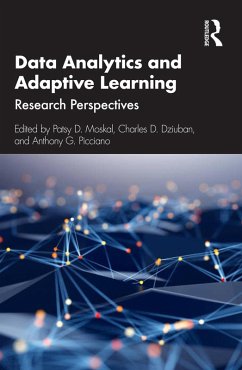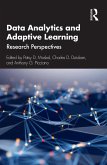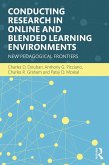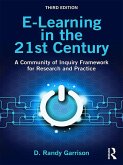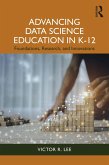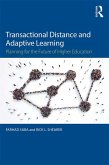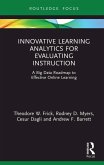Data Analytics and Adaptive Learning (eBook, PDF)
Research Perspectives
Redaktion: Moskal, Patsy D.; Picciano, Anthony G.; Dziuban, Charles D.
42,95 €
42,95 €
inkl. MwSt.
Sofort per Download lieferbar

21 °P sammeln
42,95 €
Als Download kaufen

42,95 €
inkl. MwSt.
Sofort per Download lieferbar

21 °P sammeln
Jetzt verschenken
Alle Infos zum eBook verschenken
42,95 €
inkl. MwSt.
Sofort per Download lieferbar
Alle Infos zum eBook verschenken

21 °P sammeln
Data Analytics and Adaptive Learning (eBook, PDF)
Research Perspectives
Redaktion: Moskal, Patsy D.; Picciano, Anthony G.; Dziuban, Charles D.
- Format: PDF
- Merkliste
- Auf die Merkliste
- Bewerten Bewerten
- Teilen
- Produkt teilen
- Produkterinnerung
- Produkterinnerung

Bitte loggen Sie sich zunächst in Ihr Kundenkonto ein oder registrieren Sie sich bei
bücher.de, um das eBook-Abo tolino select nutzen zu können.
Hier können Sie sich einloggen
Hier können Sie sich einloggen
Sie sind bereits eingeloggt. Klicken Sie auf 2. tolino select Abo, um fortzufahren.

Bitte loggen Sie sich zunächst in Ihr Kundenkonto ein oder registrieren Sie sich bei bücher.de, um das eBook-Abo tolino select nutzen zu können.
Data Analytics and Adaptive Learning offers new insights into the use of emerging data analysis and adaptive techniques in multiple learning settings.
- Geräte: PC
- mit Kopierschutz
- eBook Hilfe
Andere Kunden interessierten sich auch für
![Data Analytics and Adaptive Learning (eBook, ePUB) Data Analytics and Adaptive Learning (eBook, ePUB)]() Data Analytics and Adaptive Learning (eBook, ePUB)42,95 €
Data Analytics and Adaptive Learning (eBook, ePUB)42,95 €![Conducting Research in Online and Blended Learning Environments (eBook, PDF) Conducting Research in Online and Blended Learning Environments (eBook, PDF)]() Charles D. DziubanConducting Research in Online and Blended Learning Environments (eBook, PDF)45,95 €
Charles D. DziubanConducting Research in Online and Blended Learning Environments (eBook, PDF)45,95 €![E-Learning in the 21st Century (eBook, PDF) E-Learning in the 21st Century (eBook, PDF)]() D. Randy GarrisonE-Learning in the 21st Century (eBook, PDF)38,95 €
D. Randy GarrisonE-Learning in the 21st Century (eBook, PDF)38,95 €![Advancing Data Science Education in K-12 (eBook, PDF) Advancing Data Science Education in K-12 (eBook, PDF)]() Victor R. LeeAdvancing Data Science Education in K-12 (eBook, PDF)43,95 €
Victor R. LeeAdvancing Data Science Education in K-12 (eBook, PDF)43,95 €![Cross Reality (XR) and Immersive Learning Environments (ILEs) in Education (eBook, PDF) Cross Reality (XR) and Immersive Learning Environments (ILEs) in Education (eBook, PDF)]() Cross Reality (XR) and Immersive Learning Environments (ILEs) in Education (eBook, PDF)42,95 €
Cross Reality (XR) and Immersive Learning Environments (ILEs) in Education (eBook, PDF)42,95 €![Transactional Distance and Adaptive Learning (eBook, PDF) Transactional Distance and Adaptive Learning (eBook, PDF)]() Farhad SabaTransactional Distance and Adaptive Learning (eBook, PDF)45,95 €
Farhad SabaTransactional Distance and Adaptive Learning (eBook, PDF)45,95 €![Innovative Learning Analytics for Evaluating Instruction (eBook, PDF) Innovative Learning Analytics for Evaluating Instruction (eBook, PDF)]() Theodore W. FrickInnovative Learning Analytics for Evaluating Instruction (eBook, PDF)19,95 €
Theodore W. FrickInnovative Learning Analytics for Evaluating Instruction (eBook, PDF)19,95 €-
-
-
Data Analytics and Adaptive Learning offers new insights into the use of emerging data analysis and adaptive techniques in multiple learning settings.
Hinweis: Dieser Artikel kann nur an eine deutsche Lieferadresse ausgeliefert werden.
Dieser Download kann aus rechtlichen Gründen nur mit Rechnungsadresse in A, B, BG, CY, CZ, D, DK, EW, E, FIN, F, GR, HR, H, IRL, I, LT, L, LR, M, NL, PL, P, R, S, SLO, SK ausgeliefert werden.
Hinweis: Dieser Artikel kann nur an eine deutsche Lieferadresse ausgeliefert werden.
Produktdetails
- Produktdetails
- Verlag: Taylor & Francis eBooks
- Seitenzahl: 364
- Erscheinungstermin: 25. August 2023
- Englisch
- ISBN-13: 9781000929232
- Artikelnr.: 68339919
- Verlag: Taylor & Francis eBooks
- Seitenzahl: 364
- Erscheinungstermin: 25. August 2023
- Englisch
- ISBN-13: 9781000929232
- Artikelnr.: 68339919
- Herstellerkennzeichnung Die Herstellerinformationen sind derzeit nicht verfügbar.
Patsy D. Moskal is Director of the Digital Learning Impact Evaluation in the Research Initiative for Teaching Effectiveness at the University of Central Florida, USA. Charles D. Dziuban is Director of the Research Initiative for Teaching Effectiveness at the University of Central Florida, USA. Anthony G. Picciano is Professor of Education Leadership at Hunter College and Professor in the PhD program in Urban Education at the City University of New York Graduate Center, USA.
Section 1: Introduction 1. Data Analytics and Adaptive Learning: Increasing
the Odds Section 2: Analytics 2. What We Want Versus What We Have:
Transforming Teacher Performance Analytics to Personalize Professional
Development 3. System-Wide Momentum 4. A Precise and Consistent Early
Warning System for Identifying At-Risk Students 5. Predictive Analytics,
Artificial Intelligence and the Impact of Delivering Personalized Supports
to Students from Underserved Backgrounds 6. Predicting Student Success with
Self-regulated Behaviors: A Seven-year Data Analytics Study on a Hong Kong
University English Course 7. Back to Bloom: Why Theory Matters in Closing
the Achievement Gap 8. The Metaphors We Learn By: Toward a Philosophy of
Learning Analytics Section 3: Adaptive Learning 9. A Cross-Institutional
Survey of the Instructor Use of Data Analytics in Adaptive Courses 10. Data
Analytics in Adaptive Learning for Equitable Outcomes 11. Banking on
Adaptive Questions to Nudge Student Responsibility for Learning in General
Chemistry 12. 3-Year Experience with Adaptive Learning: Faculty and Student
Perspectives 13. Analyzing Question Items with Limited Data 14. When
Adaptivity and Universal Design for Learning are Not Enough: Bayesian
Network Recommendations for Tutoring Section 4: Organizational
Transformation 15. Sprint to 2027: Corporate Analytics in the Digital Age
16. Academic Digital Transformation: Focused on Data, Equity and Learning
Science Section 5: Closing 17. Future Technological Trends and Research -
Tony Picciano
the Odds Section 2: Analytics 2. What We Want Versus What We Have:
Transforming Teacher Performance Analytics to Personalize Professional
Development 3. System-Wide Momentum 4. A Precise and Consistent Early
Warning System for Identifying At-Risk Students 5. Predictive Analytics,
Artificial Intelligence and the Impact of Delivering Personalized Supports
to Students from Underserved Backgrounds 6. Predicting Student Success with
Self-regulated Behaviors: A Seven-year Data Analytics Study on a Hong Kong
University English Course 7. Back to Bloom: Why Theory Matters in Closing
the Achievement Gap 8. The Metaphors We Learn By: Toward a Philosophy of
Learning Analytics Section 3: Adaptive Learning 9. A Cross-Institutional
Survey of the Instructor Use of Data Analytics in Adaptive Courses 10. Data
Analytics in Adaptive Learning for Equitable Outcomes 11. Banking on
Adaptive Questions to Nudge Student Responsibility for Learning in General
Chemistry 12. 3-Year Experience with Adaptive Learning: Faculty and Student
Perspectives 13. Analyzing Question Items with Limited Data 14. When
Adaptivity and Universal Design for Learning are Not Enough: Bayesian
Network Recommendations for Tutoring Section 4: Organizational
Transformation 15. Sprint to 2027: Corporate Analytics in the Digital Age
16. Academic Digital Transformation: Focused on Data, Equity and Learning
Science Section 5: Closing 17. Future Technological Trends and Research -
Tony Picciano
Section 1: Introduction 1. Data Analytics and Adaptive Learning: Increasing
the Odds Section 2: Analytics 2. What We Want Versus What We Have:
Transforming Teacher Performance Analytics to Personalize Professional
Development 3. System-Wide Momentum 4. A Precise and Consistent Early
Warning System for Identifying At-Risk Students 5. Predictive Analytics,
Artificial Intelligence and the Impact of Delivering Personalized Supports
to Students from Underserved Backgrounds 6. Predicting Student Success with
Self-regulated Behaviors: A Seven-year Data Analytics Study on a Hong Kong
University English Course 7. Back to Bloom: Why Theory Matters in Closing
the Achievement Gap 8. The Metaphors We Learn By: Toward a Philosophy of
Learning Analytics Section 3: Adaptive Learning 9. A Cross-Institutional
Survey of the Instructor Use of Data Analytics in Adaptive Courses 10. Data
Analytics in Adaptive Learning for Equitable Outcomes 11. Banking on
Adaptive Questions to Nudge Student Responsibility for Learning in General
Chemistry 12. 3-Year Experience with Adaptive Learning: Faculty and Student
Perspectives 13. Analyzing Question Items with Limited Data 14. When
Adaptivity and Universal Design for Learning are Not Enough: Bayesian
Network Recommendations for Tutoring Section 4: Organizational
Transformation 15. Sprint to 2027: Corporate Analytics in the Digital Age
16. Academic Digital Transformation: Focused on Data, Equity and Learning
Science Section 5: Closing 17. Future Technological Trends and Research -
Tony Picciano
the Odds Section 2: Analytics 2. What We Want Versus What We Have:
Transforming Teacher Performance Analytics to Personalize Professional
Development 3. System-Wide Momentum 4. A Precise and Consistent Early
Warning System for Identifying At-Risk Students 5. Predictive Analytics,
Artificial Intelligence and the Impact of Delivering Personalized Supports
to Students from Underserved Backgrounds 6. Predicting Student Success with
Self-regulated Behaviors: A Seven-year Data Analytics Study on a Hong Kong
University English Course 7. Back to Bloom: Why Theory Matters in Closing
the Achievement Gap 8. The Metaphors We Learn By: Toward a Philosophy of
Learning Analytics Section 3: Adaptive Learning 9. A Cross-Institutional
Survey of the Instructor Use of Data Analytics in Adaptive Courses 10. Data
Analytics in Adaptive Learning for Equitable Outcomes 11. Banking on
Adaptive Questions to Nudge Student Responsibility for Learning in General
Chemistry 12. 3-Year Experience with Adaptive Learning: Faculty and Student
Perspectives 13. Analyzing Question Items with Limited Data 14. When
Adaptivity and Universal Design for Learning are Not Enough: Bayesian
Network Recommendations for Tutoring Section 4: Organizational
Transformation 15. Sprint to 2027: Corporate Analytics in the Digital Age
16. Academic Digital Transformation: Focused on Data, Equity and Learning
Science Section 5: Closing 17. Future Technological Trends and Research -
Tony Picciano
